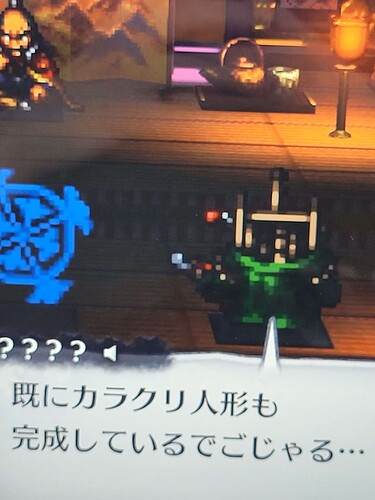I was under the impression that でござる can only come after nouns, what’s going on here? ご武運を
Correct me if I’m wrong but it’s coming from this grammar point, correct? Just different formalities (ある => ござる).
In which case you can use it after a verb if you use a normalizer (の、こと). However I think because the game is mimicking real speech, people drop all those particles I spent HOURS learning ALL. THE. TIME.
Show me on this doll where japanese grammar touched you 
It’s just used as a personality marker. If the character was a cat it could be にゃー, but apparently it’s some kind of old ninja or samurai kind of character, so they used でごじゃる instead of にゃー.
There is no particle missing or anything, it’s just not being used as a copula in the first place.
口癖, the bane of a Japanese learner’s existence.
摩訶不思議… thanks
Update in case anyone else sees something like this in the future: it turns you can use でござる after any part of speech, though you need の after verbs and adjectives I believe. I spoke with a professor and she told me that, indeed, the の was simply dropped. I came back to add this because there was some discrepancy over this でごじゃる and its status as a 口癖 (I don’t think it is)
Grammatically, you can use でござる exactly like である. It’s just a more respectful version of it.
But in this case is still just 口癖:
- It’s not でござる, it’s でごじゃる, which doesn’t have much of a basis in history
- The rest of the speech, except for another use of でごじゃる, is standard modern Japanese (where でござる is just not used without ます, and でごじゃる does not exist)
- でござる etc are well established as 口癖 and it doesn’t make sense to discount that, especially in this case where treating it as 口癖 is the only explanation where the text is 100% free of grammatical errors
- The other characters in the same conversation don’t use it at all (but they do use other personality markers)
Even if there was a の missing, these points wouldn’t change, and therefore it doesn’t really make sense to assume it’s missing.
With this kind of personality marker, normal grammar goes out of the window. The author can’t just add の because that changes the meaning. But they need to use the personality marker frequently enough to actually work as a marker. The solution to the dilemma is that they just discard the historical roots and use it in the exact same way as something like にゃー would be used for a cat character, where nobody would ever think to wonder about missing particles either.
It’s actually not that different from how です came to be usable after い adjectives. People wanted to sound like a polite but not super stiff character, I guess…

